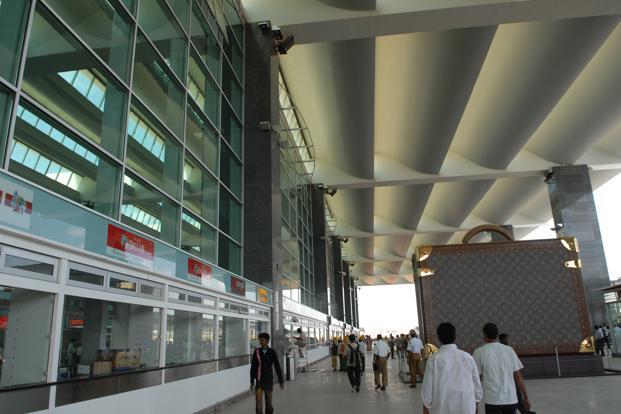The Kempegowda airport is looking to generate 14.6 MW of solar power.
Bangalore International Airport Ltd (BIAL), which operates the Kempegowda airport, is evaluating bids from companies interested in supplying solar power or building solar panels beside its runway and at the car park, as it seeks to meet 40% of its power needs through clean energy by next year.
The move, confirmed by BIAL officials, follows Kerala’s Cochin airport in August this year turning the first airport in the world to run fully on solar power. It also coincides with a drive by the central government to boost India’s installed solar power capacity by five times to 100 GW within the next seven years to reduce fossil fuel use and curb pollution.
While the Kerala airport commissioned a 12 megawatt solar project in August, BIAL is looking to generate 14.6 MW of solar power.
The request for proposal documents, available on the airport’s website, shows that it intends to procure 12 MW annually via open access and the rest by setting up solar power plants on a BOOT (build, own, operate and transfer) basis for a minimum 20 years.
The Kempegowda airport used about 50 million units of electricity from January to September 2014, according to an estimate from World Resources Institute (WRI), a US-headquartered environmental research institute that advised BIAL on the bidding.
“Not a single unit in this 50 million comes from solar right now. Having suitable weather conditions to harness solar power, going green could yield economic and environmental benefits for the airport,” said an official associated with Green Power Market Development Group (India) at WRI. He requested anonymity.
“Renewable energy has huge environmental benefits and BIAL will continue to invest in accelerating its development. As part of its green strategy, BIAL embarked on adopting renewable energy for the airport operations in early 2015. These projects have been tendered out and the bids are currently under evaluation and are expected to be awarded shortly. The projects are expected to be completed in early 2016,” airport authorities said in an email.
To be sure, the Bengaluru airport spread across 3000 acres is way behind the green energy initiatives of the Cochin airport, which is generating 12 MW of solar power despite having only 1300 acres.
When asked about the challenges Bengaluru will have to face, Cochin International Airport Ltd director A.C.K. Nair said it needs to be seen whether it will be feasible to purchase 20 million units of solar power from the open market.
“We didn’t go for open access route because it requires a large extent of land and there is a shortage of suppliers and the cost is high. But it has a positive side because instead of capital expenditure, they will have to provide only revenue expenditure. How they are going to do it, we will have to wait and see,” said Nair.
Originally posted on LiveMint
Photo courtesy of Hemant Mishra/Mint



